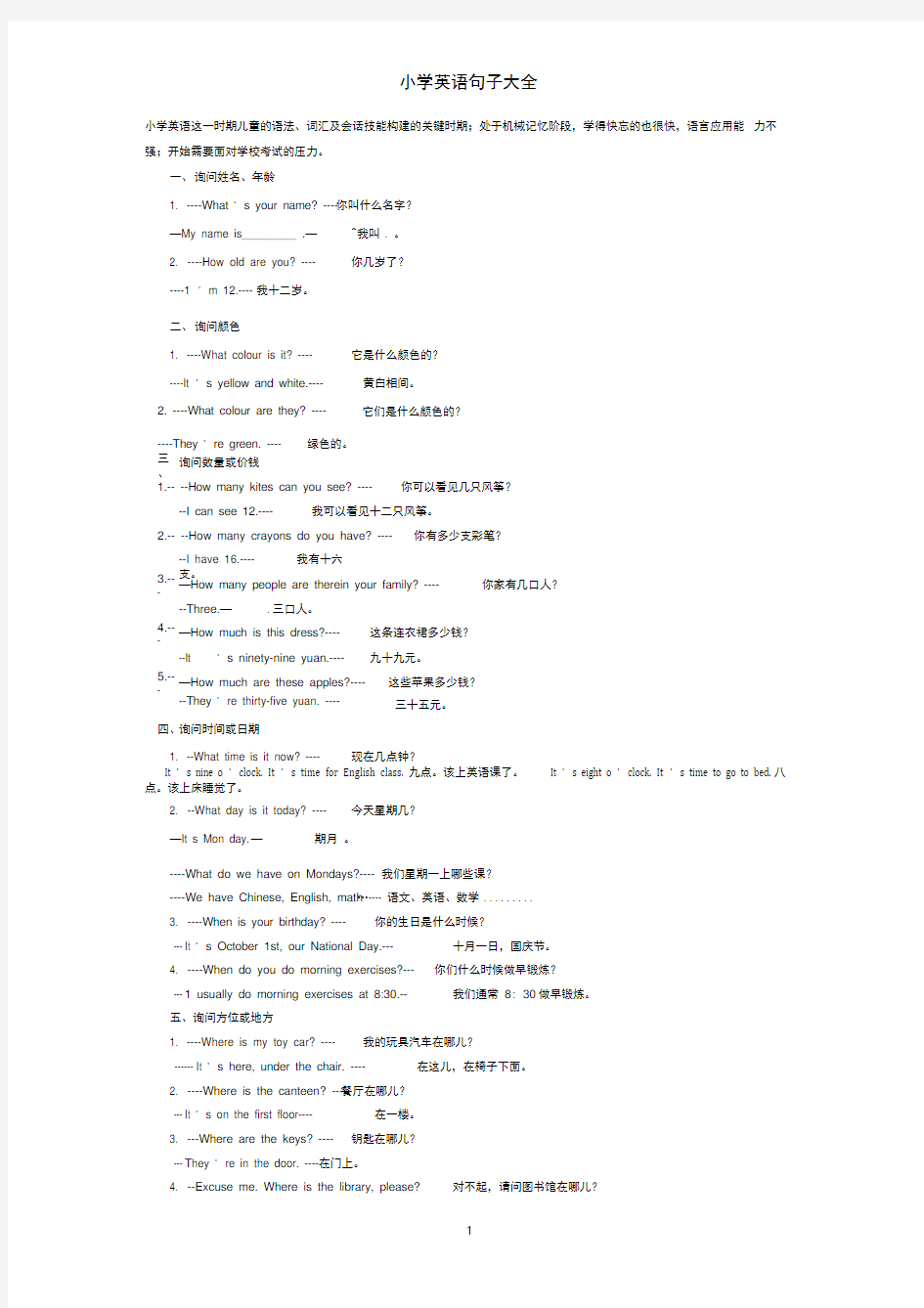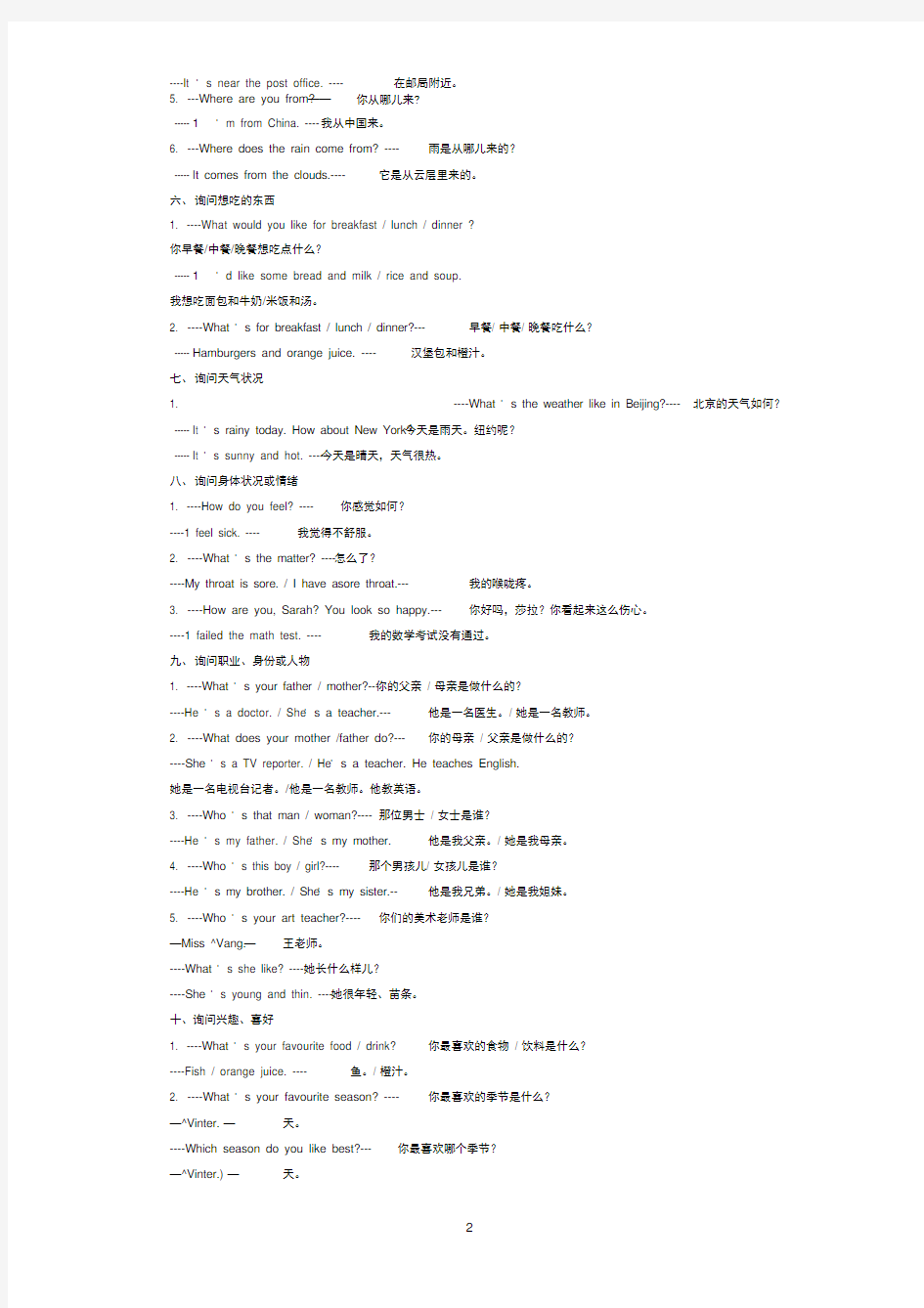

小学英语句子大全
小学英语这一时期儿童的语法、词汇及会话技能构建的关键时期;处于机械记忆阶段,学得快忘的也很快,语言应用能力不强;开始需要面对学校考试的压力。
一、询问姓名、年龄
1. ----What ' s your name? ---- 你叫什么名字?
—My name is ________ . —^我叫 . 。
2. ----How old are you? ---- 你几岁了?
----1 ' m 12.---- 我十二岁。
二、询问颜色
1. ----What colour is it? ---- 它是什么颜色的?
----It ' s yellow and white.---- 黄白相间。
2. ----What colour are they? ---- 它们是什么颜色的?
----They ' re green. ---- 绿色的。
三
、
询问数量或价钱
1.-- --How many kites can you see? ---- 你可以看见几只风筝?
--I can see 12.---- 我可以看见十二只风筝。
2.-- --How many crayons do you have? ---- 你有多少支彩笔?
--I have 16.---- 我有十六
支。
3.--
-
—How many people are therein your family? ---- 你家有几口人?
--Three.—.三口人。
4.--
-
—How much is this dress?---- 这条连衣裙多少钱?
--It ' s ninety-nine yuan.---- 九十九元。
5.--- —How much are these apples?---- 这些苹果多少钱?--They ' re thirty-five yuan. ---- 三十五元。
四、询问时间或日期
1. --What time is it now? ---- 现在几点钟?
It ' s nine o ' clock. It ' s time for English class. 九点。该上英语课了。It ' s eight o ' clock. It ' s time to go to bed. 八点。该上床睡觉了。
2. --What day is it today? ---- 今天星期几?
—It s Mon day. —期月。
----What do we have on Mondays?---- 我们星期一上哪些课?
----We have Chinese, English, math …---- 语文、英语、数学.........
3. ----When is your birthday? ---- 你的生日是什么时候?
--- I t ' s October 1st, our National Day.--- 十月一日,国庆节。
4. ----When do you do morning exercises?--- 你们什么时候做早锻炼?
--- 1 usually do morning exercises at 8:30.-- 我们通常8: 30做早锻炼。
五、询问方位或地方
1. ----Where is my toy car? ---- 我的玩具汽车在哪儿?
------ I t ' s here, under the chair. ---- 在这儿,在椅子下面。
2. ----Where is the canteen? ---- 餐厅在哪儿?
--- I t ' s on the first floor---- 在一楼。
3. ---Where are the keys? ---- 钥匙在哪儿?
--- T hey ' re in the door. ---- 在门上。
4. --Excuse me. Where is the library, please? 对不起,请问图书馆在哪儿?
----It ' s near the post office. ---- 在邮局附近。
5. ---Where are you from?——
你从哪儿来?
----- 1' m from China. ---- 我从中国来。
6. ---Where does the rain come from? ---- 雨是从哪儿来的?
----- I t comes from the clouds.---- 它是从云层里来的。
六、询问想吃的东西
1. ----What would you like for breakfast / lunch / dinner ?
你早餐/中餐/晚餐想吃点什么?
----- 1' d like some bread and milk / rice and soup.
我想吃面包和牛奶/米饭和汤。
2. ----What ' s for breakfast / lunch / dinner?--- 早餐/ 中餐/ 晚餐吃什么?
----- H amburgers and orange juice. ---- 汉堡包和橙汁。
七、询问天气状况
1. ----What ' s the weather like in Beijing?---- 北京的天气如何? ----- I t ' s rainy today. How about New York? 今天是雨天。纽约呢?
----- I t ' s sunny and hot. ---- 今天是晴天,天气很热。
八、询问身体状况或情绪
1. ----How do you feel? ---- 你感觉如何?
----1 feel sick. ---- 我觉得不舒服。
2. ----What ' s the matter? ---- 怎么了?
----My throat is sore. / I have asore throat.--- 我的喉咙疼。
3. ----How are you, Sarah? You look so happy.--- 你好吗,莎拉?你看起来这么伤心。
----1 failed the math test. ---- 我的数学考试没有通过。
九、询问职业、身份或人物
1. ----What ' s your father / mother?--- 你的父亲/ 母亲是做什么的?
----He ' s a doctor. / She ' s a teacher.--- 他是一名医生。/ 她是一名教师。
2. ----What does your mother /father do?--- 你的母亲/ 父亲是做什么的?
----She ' s a TV reporter. / He ' s a teacher. He teaches English.
她是一名电视台记者。/他是一名教师。他教英语。
3. ----Who ' s that man / woman?---- 那位男士/ 女士是谁?
----He ' s my father. / She ' s my mother. 他是我父亲。/ 她是我母亲。
4. ----Who ' s this boy / girl?---- 那个男孩儿/ 女孩儿是谁?
----He ' s my brother. / She ' s my sister.-- 他是我兄弟。/ 她是我姐妹。
5. ----Who ' s your art teacher?---- 你们的美术老师是谁?
—Miss ^Vang.—王老师。
----What ' s she like? ---- 她长什么样儿?
----She ' s young and thin. ---- 她很年轻、苗条。
十、询问兴趣、喜好
1. ----What ' s your favourite food / drink? 你最喜欢的食物/ 饮料是什么?
----Fish / orange juice. ---- 鱼。/ 橙汁。
2. ----What ' s your favourite season? ---- 你最喜欢的季节是什么?
—^Vinter. —天。
----Which season do you like best?--- 你最喜欢哪个季节?
—^Vinter.) —天。
----Why do you like winter? ---- 你为什么喜欢冬天?
----Because I can make a snowman.---- 因为可以堆雪人。
3. ----What ' s your hobby? ---- 你的爱好是什么?
----1 like collecting stamps.---- 我喜欢集邮。
----What ' s his hobby? ---- 他的爱好是什么?
----He likes riding a bike. ---- 他喜欢骑自行车。
4. ----Do you like peaches? ---- 你喜欢吃桃子吗?
----Yes, I do. / No, I don ' t.---- 喜欢。/ 不喜欢。
十^一、询问平时一般或通常做的事情
1. ----What do you do on Saturdays / on the weekends?
你星期六/周末一般做什么?
----1 usually do my homework. Sometimes I play football.
我通常做作业,有时候踢足球。
十二、询问正在做的事情
1. ----What are you doing? ---- 你在做什么?
----1 ' m doing the dishes.---- 我在洗盘子。
2. ----What ' s your father doing? ---- 你父亲正在做什么?
----He ' s writing an e-mail.---- 他正在写电子邮件。
3. ----What ' s Mike doing? ---- 迈克正在干什么?
----He ' s watching insects.---- 他正在观察昆虫。
4. ----What ' s the tiger doing? ---- 那只老虎在干什么?
----It ' s running. ---- 它在奔跑。
5. ----What are the elephants doing? ---- 那些大象在干什么?
----They ' re drinking. ---- 它们正在喝水。
十三、询问将要做的事情
1..----What are you going to do?---- 你准备做什么?
----1 ' m going to the cinema.---- 我准备去看电影。
----When are you going to do?---- 你准备什么时候去?
----This afternoon. ---- 今天下午。
2. ----Where are you going this afternoon?- 今天下午你准备到哪儿去? ----1 ' m going to the bookstore. ---- 我准备到书店去。
----What are you going to buy?---- 你打算买点儿什么?
----1 ' m going to buy a comic book. ---- 我准备买本漫画书。
十四、询问曾经做过或发生过的事情
1. ----Where did you go last weekend / yesterday / on your holiday?
----你上周末/昨天/假期到哪儿去了?
----1 went to Wuhan. ---- 我去了武汉。
2. ----How did you go there? ---- 你怎么去的?
----1 went by train. ---- 我坐火车去的。
3. ----What did you do there?---- 你在那儿做了些什么?
----1 went shopping. ---- 我去购物了。
Have a nice weekend。周末愉快。
He lives in the middle of nowhere. 他离群索居。
How much?多少钱?
I had a wonderful time here 。我在这里度过了难忘的时光。
I hope you get better soon. 我希望你很快好起来。
I ' m from America. 我来自美国。
I ' m full .我饱了。
I ' m glad to have met you 。很高兴遇到你。
I ' m home我回来了。
I ' m lost .我迷路了。
Keep in touch。保持联系。
My treat .我请客。
Please say hello to your mother for me 。请代我向你母亲问好。
She' s my mother.她是我的妈妈。
This is a real hot spot. 这个地区真繁华。
This place is like a tomb. 这个地区真冷清。
This place is like a zoo. 这个地方真热闹。
We have a new friend today. 今天我们有一位新朋友。
Where are you from? 你从哪里来?
Who s that woman? 那个女人是谁?
There be句式,用来表示某地有某物/某人
1. There is + 可数名词的单数(a / an / one...)
肯定句:There is an elephant in the zoo.
否定句:There isn't an elephant in the zoo.
一般疑问句:Is there an elephant in the zoo?
肯定回答:Yes, there is.
否定回答:No, there isn't.
划线部分提问1)an:
How many elephants are there in the zoo?(How many + 复数形式)
划线部分提问2)an elephant:
What's in the zoo?
2. There is + some 不可数名词
肯定句:There is some cake on the plate.
否定句:There isn't any cake on the plate.(注意:否定句和疑问句中some变为any)一般疑问句:Is there any cake on the plate?
肯定回答:Yes, there is.
否定回答:No, there isn't.
划线部分提问:What's on the plate?
3. There are + 可数名词的复数形式(含有some)
肯定句:There are some flowers in the garden.
否定句:There aren't any flowers in the garden.
一般疑问句:Are there any flowers in the garden?
肯定回答:Yes, there are.
否定回答:No, there aren't.
划线部分提问:What's in the garden?
4. There are + 可数名词的复数形式(含有数字)
肯定句:There are five flowers in the vase.
否定句:There aren't five flowers in the vase.
一般疑问句:Are there five flowers in the vase?
肯定回答:Yes, there are.
否定回答:No, there aren't.
划线部分提问1):five
How many flowers are there in the vase?
划线部分提问2):five flowers
What's in the vase?
5. There is + 量词是把不可数名词转换成可数的有效手段
肯定句:There is a cup of tea on the table .
改为复数句:There are two cups of tea on the table.( 三变:is---are,a---two,cup---cups)
6. 某地有某人
There is a boy in the classroom.
划线部分提问:Who's in the classroom?( 不能用What's in the classroom?)
There are twenty boys in the classroom.
划线部分提问:Who's in the classroom?
7. 邻近原则(顾头不顾尾)
There is a pencil and some books in my bag.
There are some books and a pencil in my bag.
有趣的小学英语语法口诀
相信大家都知道语法和词汇是英语学习中最基本的两个要点,只要掌握这两个基本点你学习英语的根基就扎实了。那么, 对于我们祖国的花朵小学生学英语语法,应该采用一些生动有趣的方式,下面一些小学英语语法口诀相信对大家有用。
1. 一般现在时
一般现在时态中,动词一般用原形。
表述事实讲真理,习惯动作常发生。
动词词尾加—s(es),只表单数三人称。
若变一般疑问句,得看句型是哪种。
系表结构和there be, be 放句首可完成;
若遇实义动词句,do或does莫忘用!
2. 现在进行时
Look, Listen 是标志,现在进行正发生;
有时now在句中现,“ be+ v—ing "时态成。
若问be用何形式,须看主语数、人称。
He / She is, I am . We, you, they 后are 紧跟。
v —ing形式更好记,三种构成要分清。
一般问句be提前,be后加not否定成!
3. 基数词变序数词
基变序,很容易,一二三,特殊记,th从四起。八去t来九去e,遇到ve,f替,ty变为tie,后加th莫迟疑,若想表示几十几,只变个位就可以。
4. 时间介词巧记歌
年、月、季节前须用in,(如:in 2008, inSeptember, in spring )
日期前面行不通。
遇到几号改用on,(如:on January 1)
上午、下午、晚上仍用in。(女口:in the morning /afternoon /evening)
若是某日上下午,也是用on才能行。
(女口:on the evening of the Mid —autumn Day)
正午、夜里用at,(如:at noon, at night)
时、分用法也同理。(如:,at two, at two )
如若"差"点须加to,(如:two to two)
如若"过"点改past。(如: half past one)
多说勤练牢牢记,学好英语非儿戏。
5. 谓语be的用法
我用am 你用are
除此之外的单数
包括他她还有它统统都是用is 我们你们和他们只要复数都用are
6. 一般疑问句和否定句的变化一般问句并不难,
谓语调到主语前。
大写小写有变化,
句末要把问号加。
第一人称常变二。
否定句就更简单,
中间加上一not,
谓语动词提到前。
7. 现在进行时现
在进行时很好记,
结构be+动词
ing。
be由主语来决
定,句中常用标
志词,now
look,listen !
8. 一般现在时肯定句的现在式。
不是三单用原形,是三单就加s, es,若是否定疑问句,没有be就加个do,碰到三单加does。如把does加在前,动词就要还原形。
9. 一般过去时
肯定句的过去式。
规则动词加ed,
不规则的必须记。
否定形式疑问句,
没有be加did。
如把did加在前,动词也要还原形。
10. 特殊的形容词、畐恫的比较级、最高级一分为二有两个,
一是远来一是老。
合二为一共三对,
坏病两多并两好。
还有一词双意含,
只译少来不译小。
11. 比较等级的运用原级用在as…as间,比较级用在than前。and连接两个比较级,说明“越来越怎样”。三者以上最高级,副词前可不加the。
Even, much 和a little ,也常修饰比较级。
12. 宾语从句宾语从句三要素,引导词、语序、时态。
引导词分三情况,陈述句that可省略。
一般疑问句if或whether。
碰到特殊疑问句,疑问词来担此任。语序总体为主谓。疑问词从句主语,语序不必去改变。从句时态主句定,如果主句是过去,从句相应作改变,客观真理仍现在。
13. 被动语态被动语态牢记一点,be加动词过去分词。
分析句中主和谓,承受者作主语即被动。短语动词不可忘介、副词。
另有不及物动词,只有主动无被动。还要注意其时态,与主动语态全相同。
14. 教冠a, an, the
a,an,the是冠词,就像帽子扣名词元音因素要扣an,辅音因素要扣a; an/a用来泛泛指,the是特指常牢记。